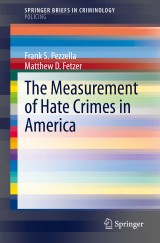Details

The Measurement of Hate Crimes in America
SpringerBriefs in Criminology
|
CHF 71.00 |
|
| Verlag: | Springer |
| Format: | |
| Veröffentl.: | 23.10.2020 |
| ISBN/EAN: | 9783030515775 |
| Sprache: | englisch |
Dieses eBook enthält ein Wasserzeichen.
Beschreibungen
<p>Using data from the Uniform Crime Reporting Hate Crime Statistics Program and the National Crime Victimization Survey, this brief highlights the uniqueness of hate or bias crime victimization. It compares these to non-bias crimes and delineates the situational circumstances that distinguish bias from non-bias offending. </p>
<p>The nuances of under-reporting shed light on bias-group and victim reasons for not reporting. By examining measurement issues associated with data collection systems, this brief helps explain why eighty-nine percent of participating law enforcement agencies report zero hate crimes each year. It describes patterns and trends in reporting the volume of general bias motivations and specific bias types, as the most prevalent hate crime offense types and most likely victims and offenders.</p>
<p>With recommendations to address issues in measurement and under-reporting, including an action plan by the Enhance the Response to Hate Crimes Advisory Committee and the International Association of Chiefs of Police, a best practice model by the Oak Creek Police Department, and other promising law enforcement reporting models, this brief provides an increasingly critical resource for law enforcement practitioners and researchers dealing with hate crimes.</p><br>
<p>The nuances of under-reporting shed light on bias-group and victim reasons for not reporting. By examining measurement issues associated with data collection systems, this brief helps explain why eighty-nine percent of participating law enforcement agencies report zero hate crimes each year. It describes patterns and trends in reporting the volume of general bias motivations and specific bias types, as the most prevalent hate crime offense types and most likely victims and offenders.</p>
<p>With recommendations to address issues in measurement and under-reporting, including an action plan by the Enhance the Response to Hate Crimes Advisory Committee and the International Association of Chiefs of Police, a best practice model by the Oak Creek Police Department, and other promising law enforcement reporting models, this brief provides an increasingly critical resource for law enforcement practitioners and researchers dealing with hate crimes.</p><br>
1. Introduction.- 2. Conceptualization.- 3. Hate Crime Reporting Systems.- 4. Measurement Issues.- 5. Patterns and Trends.- 6. The Uniqueness of Hate Crimes.- 7. Victims Under Reporting. -8. The Law Enforcement Response to Hate Crimes.- 9. Recommendations.
<div><p><b>Frank S. Pezzella</b> (Criminal Justice, SUNY Albany) is an associate professor with the Department of Criminal Justice at John Jay College of Criminal Justice and the Program of Doctoral Studies in Criminal Justice at the Graduate Center of the City University of New York. He is the author of “Hate Crime Statutes: a public policy and law enforcement dilemma,” a Springer brief about the policy dilemmas and unintended consequences of hate crime statutes. He is the coauthor of several research reports that delineate the prevalence and severity of injuries to hate crime victims. He regularly teaches undergraduate and graduate courses about hate crime offending and victimizations.</p></div><div><p>Matthew D. Fetzer (Criminal Justice, SUNY Albany) is an associate professor with the Department of Criminal Justice at Shippensburg University. His research interests include the measurement of crime and delinquency, hate crime, violence, and juvenile justice. Prior to hiscurrent position, he worked as a program research specialist for the New York State Division of Criminal Justice Services. While working for New York State, he first began conducting research on hate crime in addition to topics of homicide and domestic violence.</p></div>
<p>Using data from the Uniform Crime Reporting Hate Crime Statistics Program and the National Crime Victimization Survey, this brief highlights the uniqueness of hate or bias crime victimization. It compares these to non-bias crimes and delineates the situational circumstances that distinguish bias from non-bias offending. </p>
<p>The nuances of under-reporting shed light on bias-group and victim reasons for not reporting. By examining measurement issues associated with data collection systems, this brief helps explain why eighty-nine percent of participating law enforcement agencies report zero hate crimes each year. It describes patterns and trends in reporting the volume of general bias motivations and specific bias types, as the most prevalent hate crime offense types and most likely victims and offenders.</p>
<p>With recommendations to address issues in measurement and under-reporting, including an action plan by the Enhance the Response to Hate Crimes Advisory Committee and the International Association of Chiefs of Police, a best practice model by the Oak Creek Police Department, and other promising law enforcement reporting models, this brief provides an increasingly critical resource for law enforcement practitioners and researchers dealing with hate crimes.</p><br>
<p>The nuances of under-reporting shed light on bias-group and victim reasons for not reporting. By examining measurement issues associated with data collection systems, this brief helps explain why eighty-nine percent of participating law enforcement agencies report zero hate crimes each year. It describes patterns and trends in reporting the volume of general bias motivations and specific bias types, as the most prevalent hate crime offense types and most likely victims and offenders.</p>
<p>With recommendations to address issues in measurement and under-reporting, including an action plan by the Enhance the Response to Hate Crimes Advisory Committee and the International Association of Chiefs of Police, a best practice model by the Oak Creek Police Department, and other promising law enforcement reporting models, this brief provides an increasingly critical resource for law enforcement practitioners and researchers dealing with hate crimes.</p><br>
Addresses the current practices and issues in measurement of hate crimes in America Provides insight into causes and consequences of under-reporting of hate crime in America Recommends an action plan and best practice model for hate crime measurement, along with a comparative analysis of international hate crime measurement models

















